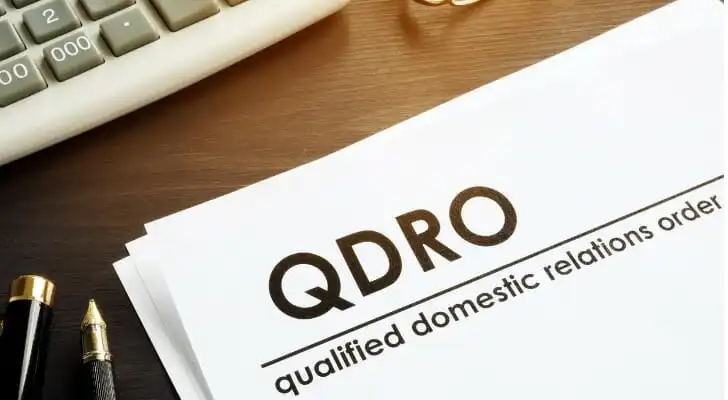

Not to be confused with a divorce decree or property settlement, a qualified domestic relations order (QDRO) specifically recognizes an ex-spouse’s, or soon-to-be-ex-spouse’s, interest in the other spouse’s qualified retirement plan. A QDRO can also recognize the rights of the plan participant’s children or other dependents. A state court or authority issues a QDRO, but a retirement plan administrator can reject it if its requirements do not agree with the plan’s rules. This is why it’s important to submit a QDRO to a retirement plan administrator as soon as possible and ideally before a divorce is final. A financial advisor who specializes in divorce can help you with a QDRO.
In a divorce, some marital assets are simpler to divvy up than others. Cash, of course, is the easiest. Salable property like a house or car isn’t always simple, but fairly it is usually straightforward. Retirement savings in employer-sponsored plans, on the other hand, can be very complicated. For example, if you liquidate the account in order to divide it, you’ll incur a steep early withdrawal penalty plus owe income taxes. However, if you leave it where it is, how does the non-participant spouse get their half, or whatever percentage that’s theirs?
Enter the qualified domestic relations order (QDRO). Issued by a state court or authority, a QDRO establishes that one spouse has a claim to some of the other spouse’s retirement plan accounts. A QDRO states the dollar amount or percentage that belongs to the non-participant spouse, called the alternate payee, and the number of payments or time period to which the order applies.
A QDRO can apply to any retirement or pension account covered by the Employee Retirement Income Security Act (ERISA). In other words, you don’t need a QDRO for individual retirement accounts (IRAs), which do not fall under ERISA. Instead, IRAs are under the typical distribution of marital assets as part of the divorce settlement.
One huge benefit of a QDRO is that it allows for early withdrawals from a 401(k) or other qualified retirement plans without incurring a penalty. As a result, if the plan allows it, an alternate payee can receive a lump sum or payments before they reach age 59.5 without a 10% IRS penalty.
A QDRO must include certain information before any judge or retirement plan administrator will approve it. That information includes:
You should most likely speak to an experienced attorney or financial advisor who works frequently with divorces for a full list of requirements or to make sure your QDRO is compliant.

Let’s take a look at an example of what a QDRO could look like through a fictional Robert and Susan, who are getting a divorce. They have been married for five years and Robert has a 401(k) currently worth $100,000. He has had this account for 10 years and it grew by a total of $50,000 (including both contributions and investment interest) during their marriage.
The court may issue a QDRO under the following terms:
On the other hand, Susan, a freelance photographer, has an IRA. It contains $40,000. She began investing in this account four years ago. As a result, the full value of this IRA is a marital asset.
Since Susan’s IRA is not covered by the ERISA, the parties will not need a QDRO to divide the IRA’s assets. They will split that account during the divorce negotiations as if it were any other portfolio.
A QDRO requires several steps. Typically, the parties and their attorneys draw up the QDRO. A judge then signs off on it. The alternate payee then submits it to the administrator of the retirement plan. Every plan governed by ERISA is required to have a process for handling a QDRO filing, and the plan must follow that process to the letter.
Once the plan administrator accepts a QDRO, it will follow the order. The administrator can take up to 18 months to respond to the parties, which is why it’s important to submit the plan as soon as possible. In an ideal world, you want to know that the QDRO is final before your divorce goes through. If there’s a rejection because, say, the order requires a lump-sum distribution and the plan does not offer that option, the alternate payee will need to renegotiate that part of the divorce settlement.
You also want to submit a QDRO promptly to ensure that you receive the full amount that is yours. However, you may not get the full amount if a plan participant dies before the QDRO goes through, or if they start taking distributions themselves.

As noted earlier, the order must be in agreement with the plan’s policy regarding QDROs. So in drawing up your QDRO, your attorney should consult the policy’s payout options to make sure your QDRO is requiring an option that is available to you.
Generally, though, there are four payout options:
A QDRO may also recognize the interest of non-spouses. When it does, it’s most commonly the plan participant’s children. The court then uses the retirement account as a means of securing child support.
In this case, the court will nominate a trustee to receive the QDRO payments on the minor’s behalf. Typically this is the child’s guardian (who is often the ex-spouse). From there the QDRO will operate as normal. The payment amount, form and structure will be specified in the QDRO and the retirement account will make those payments. Income tax will be due, but will not be any early withdrawal fees.
A qualified domestic relations order is a legal document that protects the rights of a spouse who provided less income once a divorce is final. It enables that spouse to get access to the qualified retirement plans of their ex-spouse, or it can help children to get access to those funds in some situations. It’s important that a QDRO is executed correctly to ensure the rights are correctly passed to all parties involved.
Photo credit: ©iStock.com/spxChrome, ©iStock.com/BernardaSv, ©iStock.com/designer491
Eric ReedEric Reed is a freelance journalist who specializes in economics, policy and global issues, with substantial coverage of finance and personal finance. He has contributed to outlets including The Street, CNBC, Glassdoor and Consumer Reports. Eric’s work focuses on the human impact of abstract issues, emphasizing analytical journalism that helps readers more fully understand their world and their money. He has reported from more than a dozen countries, with datelines that include Sao Paolo, Brazil; Phnom Penh, Cambodia; and Athens, Greece. A former attorney, before becoming a journalist Eric worked in securities litigation and white collar criminal defense with a pro bono specialty in human trafficking issues. He graduated from the University of Michigan Law School and can be found any given Saturday in the fall cheering on his Wolverines.
Read More About Retirement



More from SmartAsset
SmartAsset Advisors, LLC ("SmartAsset"), a wholly owned subsidiary of Financial Insight Technology, is registered with the U.S. Securities and Exchange Commission as an investment adviser. SmartAsset's services are limited to referring users to third party advisers registered or chartered as fiduciaries ("Adviser(s)") with a regulatory body in the United States that have elected to participate in our matching platform based on information gathered from users through our online questionnaire. SmartAsset receives compensation from Advisers for our services. SmartAsset does not review the ongoing performance of any Adviser, participate in the management of any user's account by an Adviser or provide advice regarding specific investments.
We do not manage client funds or hold custody of assets, we help users connect with relevant financial advisors.
This is not an offer to buy or sell any security or interest. All investing involves risk, including loss of principal. Working with an adviser may come with potential downsides such as payment of fees (which will reduce returns). There are no guarantees that working with an adviser will yield positive returns. The existence of a fiduciary duty does not prevent the rise of potential conflicts of interest.